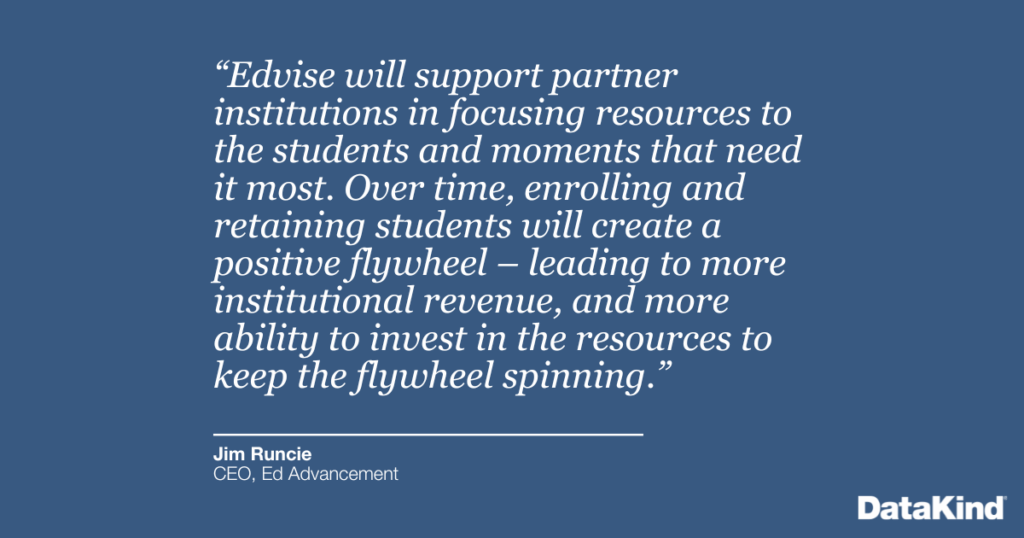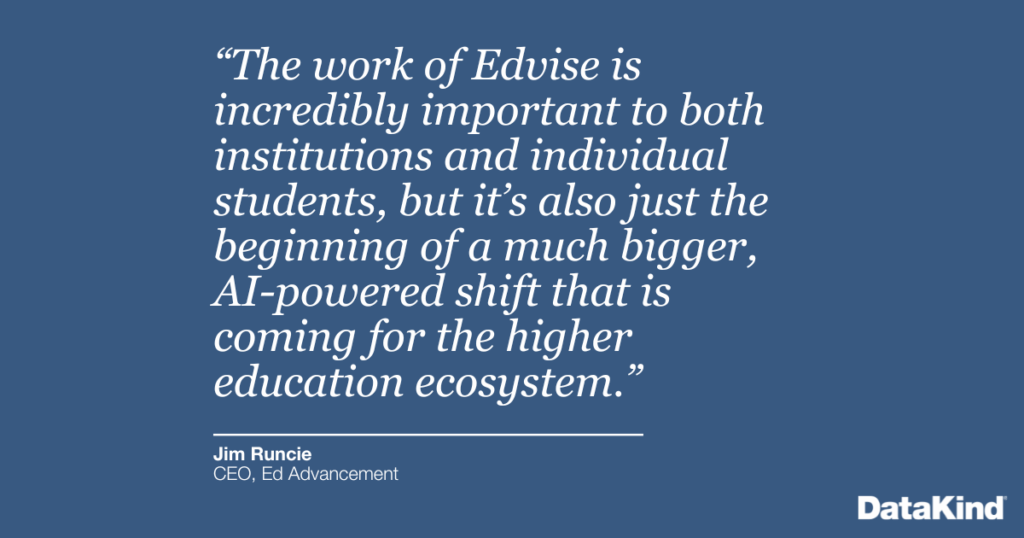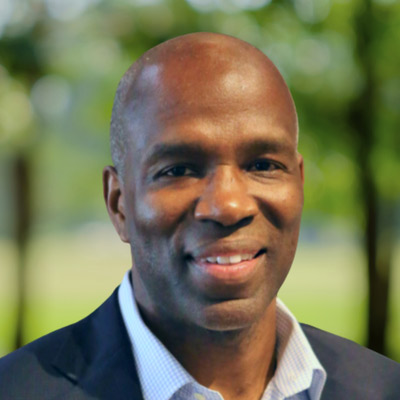DataKind and Ed Advancement have joined forces to expand equitable access to responsible AI in higher education – starting with Historically Black Colleges and Universities (HBCUs). Through this partnership, DataKind is expanding access to its Edvise product that empowers institutional leaders and academic advisors to strengthen student engagement, improve outcomes, and make data-informed decisions that drive long-term sustainability. This collaboration includes a new Learning Circle series that tackles AI in higher education, creating a space for campus leaders to share insights, explore ethical practices, and build a collective vision for how AI can enhance student success.
At DataKind, we believe that when used responsibly, AI can be a force for good. That vision drives Edvise, our AI-powered platform that helps higher education leaders identify and support students, strengthen engagement, and improve outcomes – allowing institutions to focus their time, talent, and resources where they have the greatest impact.
The stakes are high: Historically Black Colleges and Universities (HBCUs) play a vital role in advancing educational equity and opportunity. With a recent surge in HBCU enrollments, reflecting renewed national attention and student interest, the opportunity to scale data-driven student success efforts is both timely and critical.
To help ensure institutions have the tools to support their growing classes of incoming students, DataKind is partnering with Ed Advancement, a mission-driven organization dedicated to strengthening HBCUs and other mission-focused institutions. The partnership ensures that these campuses can harness the power of AI responsibly and effectively to improve student success. Central to this effort is a commitment to culturally responsive practices that honor the unique histories, traditions, and communities of HBCUs.
This collaboration combines DataKind’s leadership in data science and AI for social impact with Ed Advancement’s deep sector knowledge and trusted relationships. Together, we’re tailoring Edvise for HBCUs and co-launching a Learning Circle series on AI in higher education – helping institutional leaders cut through the hype, share what works, and explore practical, ethical, and culturally responsive ways to apply AI to real challenges. Already, the first Learning Circle drew leaders from 18 HBCUs, underscoring the strong demand for collaborative, responsible innovation in this space.
For both DataKind and Ed Advancement, this partnership is about more than technology – it’s about ensuring the benefits of AI reach every campus and every student. We spoke with Jim Runcie, Chief Executive Officer of Ed Advancement, about how this partnership is supporting HBCUs in their digital transformation journeys and how tools like Edvise can help institutions focus their capacity on what matters most: helping students thrive.
Ed Advancement has been a strong advocate for HBCUs. Why is ensuring equitable access to emerging technologies like AI so important for these schools and their students?
HBCUs enroll high numbers of first-generation students and students from under-resourced backgrounds, creating pathways to the middle class. For HBCUs, AI tools can help these institutions maximize their capacity, allowing them to focus on high-value student interactions, rather than paperwork or administrative bottlenecks.
From transforming teaching and learning to optimizing institutional functions, AI has the potential to shift nearly every aspect of higher education. We envision AI enabling streamlined administrative processes, personalized learning pathways, and improved retention – key factors in institutional sustainability.
DataKind and Ed Advancement are partnering to make Edvise more accessible and useful for HBCUs. From your perspective, what makes this collaboration particularly impactful for the institutions you serve?
Our partnership combines DataKind’s advanced analytics and machine learning expertise with Ed Advancement’s sector knowledge and trusted relationships, ensuring solutions address real institutional priorities. Tailoring Edvise for HBCUs ensures that the collaboration transforms complex data into actionable insights that support enrollment growth, student success, and long-term sustainability.
This approach not only empowers HBCU leaders to make data-informed decisions but also may enable institutions to skip past prior waves of tech investment (for example, earlier stages of student success analytics platforms) and jump to newer approaches that improve outcomes for students.
We recently co-launched a series of Learning Circles on AI in higher education. What excites you about this format, and how do you see it helping leaders cut through the hype and focus on what really matters?
Ed Advancement realized relatively early on in our work supporting the digital transformation of HBCUs that there is incredible power in bringing technology, admissions, and student success leaders together to collaborate across institutions. We’ve seen the generosity and thoughtfulness of institutional leaders in sharing what works, what doesn’t, and how they’ve overcome shared challenges.
As a result, we’re enthusiastic about bringing institutions together for a series of Learning Circles on AI in higher education. Offering a space for candid conversations among friendly colleagues is valuable, particularly when the unknowns around AI loom so large.
The first Learning Circle focused on “What is Really Happening” with AI on campuses today. What early reflections can you share from that session, and what surprised you about the discussion?
Early reflections from the first Learning Circle revealed both optimism and urgency among campus leaders. Participants were energized by the opportunity to explore how AI could help streamline operations and personalize learning. But they were equally clear-eyed about the challenges – both the limitations inherent in AI, like the potential for algorithmic bias, as well as the large number of unanswered questions at their own institutions about who should drive AI adoption, and how.
One of the most encouraging moments was watching participants connect over shared experiences and challenges – everything from limited IT bandwidth to questions about governance and policy. As the discussion gained momentum, several attendees signed up for future sessions. We expect even richer conversations in the next Learning Circles as participants return with new insights and examples from their own campuses.
Many institutions are navigating how best to build internal capacity and expertise around data and AI. How does this partnership help lower barriers for schools, especially HBCUs, that want to use these tools to better support students?
Capacity was a top concern among the participants of the Learning Circle. Many of these institutions have lean operations, and staff are often already spread relatively thin. As with many of the other digital tools we implement with our partners, the use of Edvise can actually create new capacity through efficiencies – but institutions need help getting from here to there.
From your vantage point, how does Edvise complement the broader work you’re doing to advance equity and improve outcomes for students?
Many of our institutions have had incredible success increasing their first-year student enrollment numbers, with several realizing double-digit increases in a single year, at a time when higher education broadly has experienced contracting enrollment. Keeping these new students on track to graduation is vital.
Edvise will support partner institutions in focusing resources to the students and moments that need it most. Over time, enrolling and retaining students will create a positive flywheel – leading to more institutional revenue, and more ability to invest in the resources to keep the flywheel spinning.

What do you hope institutional leaders take away from engaging in this partnership – whether through Edvise or the Learning Circles?
DataKind’s offering – the combination of a solution that is free to the institution and also offers a chance for cross-campus collaboration – is a powerful one.
Leaders in our first Learning Circle were candid about the complexity of building not just technical capacity but also shared vision and institutional buy-in. Several noted that it feels risky to move too quickly without guardrails around ethics, data privacy, and academic integrity, yet waiting too long could leave their students and staff behind.
Creating a model where organizations like Ed Advancement can operate as an intermediary, bringing best-in-class partners like DataKind to support the needs of institutional leaders, can help institutions tackle this daunting task. The work of Edvise is incredibly important to both institutions and individual students, but it’s also just the beginning of a much bigger, AI-powered shift that is coming for the higher education ecosystem.

While AI has the potential to transform wide ranges of higher education operations, it can also feel overwhelming. Institutions may not know where to start, or who on campus can or should lead the work. We hope that through the combination of knowledge sharing and hands-on work, institutions feel more equipped to take on new AI projects.

Jim Runcie is the Chief Executive Officer of the Ed Advancement, where he leads efforts to strengthen the capacity of Historically Black Colleges and Universities and other mission-aligned institutions. Under his leadership, Ed Advancement has scaled solutions that improve student enrollment, retention, and success through data-informed decision-making and operational innovation. Previously, he served as Chief Operating Officer of Federal Student Aid in the U.S. Department of Education. (Image courtesy of Ed Advancement.)
Head image above courtesy of istock/Vladimir Vladimirov.
Join the DataKind movement.
- Interested in sponsoring a project? Partner with us.
- Interested in subscribing to our newsletter? Sign up.
- Interested in supporting our work? Donate here.



